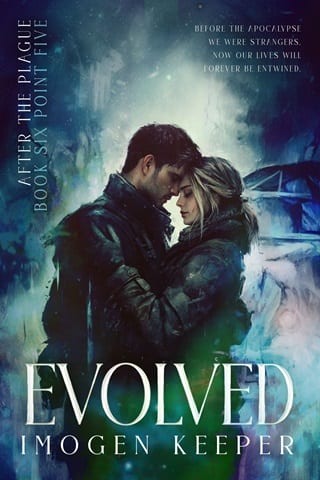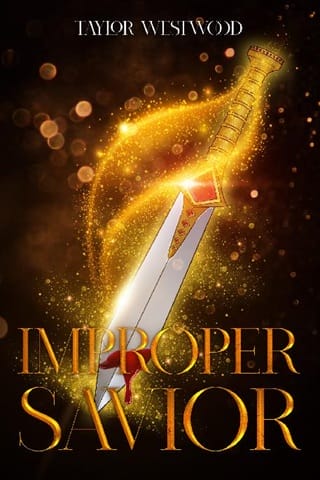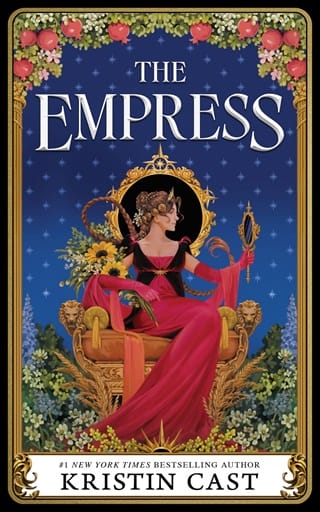4| Centuries of First Ladies
4| Centuries of First Ladies
OTTILIE
Another week has passed …
Frankie and Auden are living without electricity, and Yorke is adrift, alone in the city.
" O TTILIE," a hoarse whisper plunges its way through the walls of my dreams and rips me from sleep.
I roll toward it.
I was reading a medical book when I fell asleep, specifically a section on evaluating the success of treatment, and my dream self was panicked that the drugs we'd been giving Gran along with dialysis were all wrong. "We'll try more," I murmur.
A soft alarm nags at me. Something distant but insistent. A warning.
"Ottilie. Wake up. The sensors are going off."
The censors? Like for a census? Does he mean a poll?
My hand flaps out and hits a face, soft lips, a hard jaw that hasn't been shaved in a while.
"Knox." It's the first time I've had the guts to say it, and now only because I'm confused and half asleep.
"We need to go," he whispers.
The alarms are clear now. Not censors. Sensors. Motion sensors.
I lurch upright.
"People are inside the perimeter. They'll be in the building any second," he whispers, and immediately my senses shift, sounds prickling through my ear canal; it's raining, not snowing like I'd have expected, given how relentlessly cold it's been the last couple of days. I can hear the spatter of it through the windows, then … faint, distant, barely there, and then crystal clear … smashing glass.
I bolt to my feet, barefoot but for socks.
Somewhere in the distance, a man shouts, and the timbre of it chills my blood.
Another one calls out.
A louder crash.
More of them.
"They didn't come because of our post-its," babbles out of me.
"No. And t's too many to fight."
"We need to go," I whisper.
"Yes. Put your shoes on. Car's just off the Palm Room."
"Okay." We've planned for this since we talked by the fire. Go-bags always packed, always ready as we check the Capitol one every third day, and Gran tries to use the ham radio on the roof, and Knox goes from government building to government building to confiscates guns, and I fail to write—we're always ready.
Knox leaves me to sort my shoes and goes to Gran closer to the fire.
"I'd like to see them," Gran says, voice only slightly groggy.
As if on command, someone shouts on the other side of the building, a loud, victorious holler that would sound deranged if I hadn't seen footage of soldiers storming into conquered cities during the war.
It echoes and grows, smacking of rationale swallowed away by the joy of destruction.
"We can negotiate," Gran says. "Who are they?"
"Respectfully, ma'am, this isn't the time to negotiate. Not with them keyed up on adrenaline like this. There's too many."
My feet already in my shoes, I tug on my winter coat, my backpack onto my back. I jog to the door where Knox is hovering like a dark shadow in the doorway. Gran is beside him, quiet now. But I know her; she's thinking, probably plotting.
"We'll come back," I say.
"Don't patronize me," she snaps.
He gestures for me to follow them as he bundles her into the hallway.
The shouting and crashing are louder now.
I can make out voices.
A man says, "Dude, is this the oval fucking office?"
It's not.
Not from the direction of his voice. The Oval is in the West Wing. The bluish beam of artificial light bounces from the Diplomatic Reception Room.
Another louder smash, more voices raised in laughter. That's coming from the China Room. It's so close, only thirty or forty feet away. And it's not just one or two people. It's way more.
Barely daring to breathe, I follow Knox and Gran into the Palm Room.
The door is open there, bringing the sound of rain sloshing from a downspout and falling in heavy sheets, gusts of frigid air.
The sound of smashing plates gets louder.
It's right then that I remember what I forgot. The medical book—the one that explains dosages and, alternatives, and symptoms.
It was in my arms when I woke.
But I never put it in my bag.
I can't leave without it.
I won't.
We're leaving the dialysis machine; we're not leaving the only book I know of that explains how to tell if the pills are doing their job.
I turn around, jog back to the Map Room.
Behind me, Knox hisses my name as I dart as silently as I can with my coat on and my boots and my backpack, all of them overly loud, my breathing too, into the Map Room, the voices in the hall growing closer.
A dish smashes closer, and then there's the distinct sound of a cabinet breaking, like they've opened up the glass display covers.
The book isn't on my sofa. I yank the blanket off, the pillow, root around in the crack between the sofa.
Another shout comes, closer now, out in the hallway.
Jesus.
It's so dark.
Nothing through the windows but the disorienting pelt of rain on glass.
I pat under the sofa, breathing so hard I feel like my heart is going to explode. My fingertips hit something hard.
The book.
I grab it, hold it to my chest as I rise from my knees.
The smashing is manic now, the dishes of two and a half centuries of First Ladies probably turning to powder, as deep male laughter echoes off empty walls.
I take off running, I don't even think.
There's a shout behind me, and the blue beam of the flashlight wobbles wildly in the hall, making a shadow of me, massive and desperate, as I run.
Just before I duck into the Palm Room, I catch a fleeting glimpse of a tall man, massive, his face lit by the gleam of someone else's flashlight. He has a handlebar mustache.
"Stop." He lifts his gun, and a hundred awful reasons he might want to detail a woman have my insides feeling like jelly.
I bolt over squeaky floors toward the open rain-filled doorway.
Knox hisses, "Hurry."
Shouts behind me.
A gunshot blaring so sharp and loud it freezes my blood, and even if drawing my gun made sense, I wouldn't be capable of it.
Not now.
Out into the icy rain, the colonnade, the Rose Garden, farther into grass, past the place we buried Gina, around a corner, and into the waiting car, Gran in the back.
I throw myself into the passenger side, the image of that man, huge, the handlebar mustache, keeps flashing across the backs of my eyelids.
Knox slams the door behind me.
My lips and cheeks and hair are soaked as I lean forward to see through the rain-washed windshield as he vaults over the hood, around the car, throwing himself into the driver seat like it's all one coordinated motion, sliding the car into gear at the same time he pulls his door shut.
Lights flare at the exit of the White House, blue-white scattering like a swarm of angry fireflies.
The wheels bump over a curb, and we're driving sheer across the South Lawn. More gunfire sounds behind us, clatteringly loud over the wipers wompwompwomping .
A bullet hits the car. Once, then twice, a smash and a metallic squeal, a spray of orange sparks, but Knox chose this car, and Knox is Secret Service, which means it could probably withstand a ballistic missile.
Maybe.
Even ballistic glass has a breaking point.
I can barely breathe as he revs the engine, and we blast down the drive toward the first of many checkpoints, where staffers had to stop and show credentials, but there are no gates anymore and no guards to guard them.
He makes a hard right turn that has my shoulder bumping against the door.
Behind us, headlights flash on as blinding lighthouse beams in the night.
"Should I fire back?" I ask.
"No, windows up, heads down."
We race down the row of parking spaces, iron and concrete, and hedge row walls behind those, blasting toward the exit.
More gunfire.
"Why are they shooting at us?" I ask for no real reason other than that I'm thinking about it. "Who are they?"
"And why do they care if we leave?" Gran asks in the backseat. "And why come in the night and the rain?"
A bullet slams into the car, ricochets off with a terrible sound.
I turn around, frantic she might have been hurt, but I can't make out anything but darkness.
"Were you hit?" I ask frantically as Knox barrels us through the final gate and takes a hard left onto Pennsylvania Avenue, where he slams the gas, and we pick up speed, still dark, so dark, heading toward the river at first, following his preplanned route.
"No," she says, turning away from peering out the back window and facing front again. "You?"
I shake my head. "Knox?"
"No." He slows, and the sloshing sound outside says we've hit standing water. "Road's flooded."
He shifts the car into reverse, and the rearview camera blinks on, but it's useless in the dark and splattered with rain. His hand settles on the back of my seat, and he rotates to look over his shoulder as he does a quick right turn, jaw clenched in the dim light coming off the darkened screen in the dashboard.
And now we're heading uphill, which means, given the turns we've made, we must be heading toward Georgetown, one of the two escape locations we've discussed.
In the relative calm, I notice how cold the inside of the car is and turn on the heat, my hands wet with rain, my hair sticking to my cheeks.
"We've lost them," Knox says a few minutes later as we're driving through the dark and rain on yet another side street.
"We can't risk headlights, can we?" I ask.
"I think the risk of drawing attention right now is higher than the risk of driving in the dark."
We plug along,
I help the best I can, find a few street names, reflective white names on jungle green signs rendered nearly invisible by the dark as we make out the shadows of townhouses and row homes that I think are Foggy Bottom, then the glassy storefronts tell me we're in Georgetown, M Street just for a minute, and then we're driving a clear uphill on Wisconsin Avenue, past restaurants I've been to and stores I haven't, all of them dark shadows beyond the rain, the roofs barely visible against the darkened clouds.
He turns right into the neighborhood of massive townhomes, over bumpy cobblestones, moving slowly.
And we're doing fine. It feels like the coast is clear, the end right in sight, with only a couple blocks to go.
Full of hope and certainty, already shifting gears toward how angry Gran will be, how we just fled instead of staked our claim.
One second, we're moving along at fifteen or so miles per hour in the driving rain, and the next …
We're not.
The car slams into a dead stop.
 Fullepub
Fullepub 



